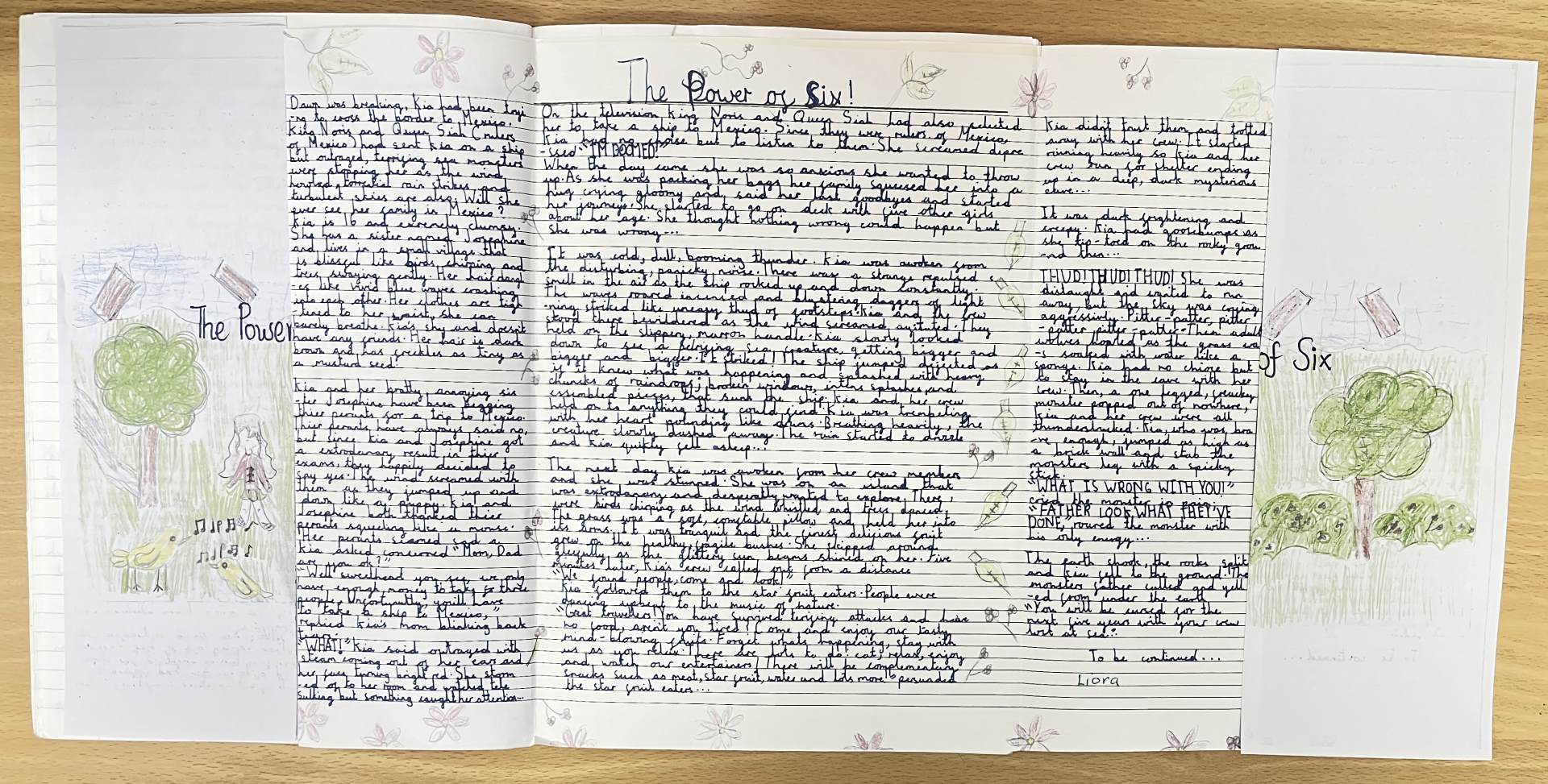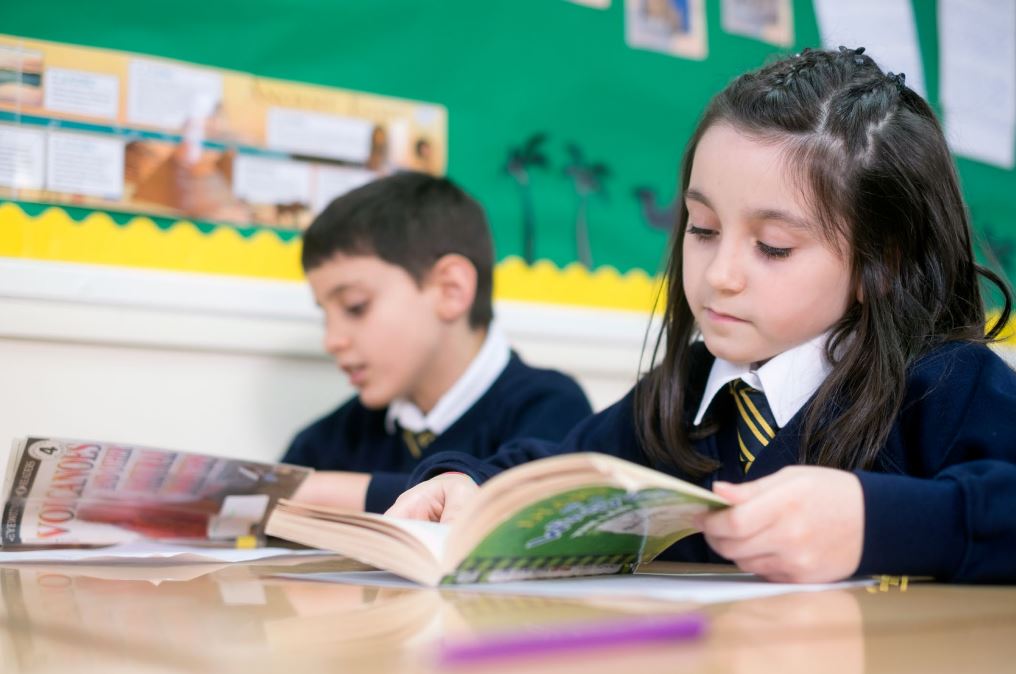English Intent,
Implementation and Impact
Whole School
Intent
 In line with the National Curriculum, all pupils at St Stephens access an inspiring and engaging English curriculum that focuses children on the building blocks of word recognition through high-quality phonics teaching. We build on these foundations with the teaching of comprehension and understanding skills. Through whole-class reading; we enable children to access a wide range of high-quality texts that reflect the diversity of our community and world. Children are not only developing excellent communication skills but are fostering a lifelong love of reading. Our Intent is that children leave St Stephens with excellent written and communication skills, are confident in their proficiency in using the English language and have a genuine love for reading. We teach children how to write creatively, a variety of text types and encourage them to explore their creativity through a high-level use of language.
In line with the National Curriculum, all pupils at St Stephens access an inspiring and engaging English curriculum that focuses children on the building blocks of word recognition through high-quality phonics teaching. We build on these foundations with the teaching of comprehension and understanding skills. Through whole-class reading; we enable children to access a wide range of high-quality texts that reflect the diversity of our community and world. Children are not only developing excellent communication skills but are fostering a lifelong love of reading. Our Intent is that children leave St Stephens with excellent written and communication skills, are confident in their proficiency in using the English language and have a genuine love for reading. We teach children how to write creatively, a variety of text types and encourage them to explore their creativity through a high-level use of language.
Implementation
We teach children the building blocks of word recognition through high quality phonics sessions – Read, Write, Inc. and we build on these foundations with the teaching of comprehension and understanding skills through whole-class reading, using the Literacy Tree and Hamilton Trust scheme. Our texts are carefully selected to ensure that every child is represented and can identify with the text. Through the access of this wide range of high-quality texts that reflect the diversity of our world, children are exposed to the world of literature, poetry and drama. Author visits are organised to inspire the children and promote a love for writing. Drama and dance troupes brings to life the favourites characters in texts. Educational trips are used to consolidate classroom learning and extend children’s understanding of texts. Children are taught to further expand their imagination through the use of pictorial, visual and audio visual stimuli (dual coding and supportive scaffolding) that capture different settings and characters. These support their writing of a variety of text types. Children also explore their creativity through a high-level use of language activities like storytelling, story writing competitions, poem recitation/competitions and cold and big writes.
Teachers plan their core and foundation subjects so that there are guaranteed writing opportunities for children to apply previously taught objectives in different context. We view handwriting as a vital skill and is taught using Letter Joins. Spelling is a key component of our English Curriculum. The Spelling Shed scheme aims to develop children’s awareness of spelling patterns and provide them with opportunities to apply and embed their learning.

Impact
Implementing a comprehensive English teaching approach that  incorporates high-quality phonics sessions, whole-class reading, exposure to diverse texts, author visits, and a focus on writing skills have a profound impact on the children's language development and overall education. By laying a strong foundation in word recognition through phonics, children enhance their reading fluency. Whole-class reading sessions and exposure to a wide range of texts reflecting global diversity contribute to advanced comprehension and writing skills, cultural awareness and empathy. Author visits serve as inspirational encounters, fostering a passion for reading and writing by providing a tangible connection to the creative process. The emphasis on teaching various text types and encouraging creativity through language use, equips the children with versatile writing skills. Overall, this multifaceted approach develops essential literacy skills and enhance critical thinking, motivation and engagement. Thus preparing the children for academic success and instilling a lifelong appreciation for language and literature
incorporates high-quality phonics sessions, whole-class reading, exposure to diverse texts, author visits, and a focus on writing skills have a profound impact on the children's language development and overall education. By laying a strong foundation in word recognition through phonics, children enhance their reading fluency. Whole-class reading sessions and exposure to a wide range of texts reflecting global diversity contribute to advanced comprehension and writing skills, cultural awareness and empathy. Author visits serve as inspirational encounters, fostering a passion for reading and writing by providing a tangible connection to the creative process. The emphasis on teaching various text types and encouraging creativity through language use, equips the children with versatile writing skills. Overall, this multifaceted approach develops essential literacy skills and enhance critical thinking, motivation and engagement. Thus preparing the children for academic success and instilling a lifelong appreciation for language and literature
Here you can download information for help in English.
-
3-4 WORD LIST
download_for_offline
download_for_offline3-4 WORD LIST
- English Phonics Progression download_for_offline
download_for_offlineEnglish Phonics Progression
- English PhonicSounds download_for_offline
download_for_offlineEnglish PhonicSounds
- English Reception wordlist download_for_offline
download_for_offlineEnglish Reception wordlist
- English Year1 wordlist download_for_offline
download_for_offlineEnglish Year1 wordlist
- English Year2 wordlist download_for_offline
↑download_for_offlineEnglish Year2 wordlist
- READING SUPPORT FOR PARENTS download_for_offline
download_for_offlineREADING SUPPORT FOR PARENTS
- SSS English Curriculum Map Core Texts download_for_offline
download_for_offlineSSS English Curriculum Map Core Texts
- Year 5-6 word list download_for_offline
- English Phonics Progression download_for_offline




